Interview with PBS' Gwen Ifill on "Online NewsHour"
June 22, 2005
|
Gwen Ifill: Now, my talk with the former Vermont governor and presidential
candidate who has become a lightning rod for the Republicans and a leader
for the Democrats: Howard Dean.
Howard Dean took over the Democratic National Committee four months
ago, and he hasn't stopped moving since. Twenty-three states, thousands
of handshakes and a fair number of verbal bombshells later, Dean remains
insistent and unapologetic about his high-profile efforts to change
his party.
It's unclear how much success he's had changing minds. Republicans,
who control the White House and Congress, have outraised the Democrats.
And some uneasy Democrats have chafed at Dean's more outspoken tendencies.
Embattled House Leader Tom DeLay has been under legal scrutiny, but
not charged with any crimes. This is what Dean had to say:
Howard Dean: I think Tom DeLay ought to go back to Houston where he
can serve his jail sentence.
Gwen Ifill: Then there were these comments about Republican leaders
and Republicans in general.
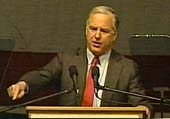 HOWARD
DEAN: A lot of them have never made an honest living in their lives. HOWARD
DEAN: A lot of them have never made an honest living in their lives.
Howard Dean (June 6, 2005) : They all behave the same and they all look
the same. And they all -- you know, it's pretty much a white, Christian
party.
Gwen Ifill: Every time Dean spoke, the Republicans pounced.
Rep. Eric Cantor: For their leader to go on the attack, accusing Republicans
of only appealing to one religion, you know, is a sign that they are
bankrupt.
Sen. Orrin Hatch: If I didn't know how bright he was, I'd call him
a raving idiot.
Gwen Ifill: Some top Democrats have invited Dean to the Capitol to
request he "tone down" the rhetoric.
Sen. Joseph Biden: He doesn't speak for me with that kind of rhetoric,
and I don't think he speaks for the majority of Democrats.
Gwen Ifill: Today, Dean released a new report about voting irregularities
during the 2004 general election in Ohio. On that and a number of other
subjects, it was clear during our conversation with him at Democratic
Party headquarters earlier today that he is still not backing down.
|
|
| |
|
Re-opening
old wounds from last year's elections |
|
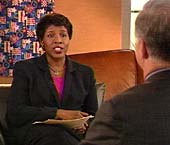 Gwen Ifill: Your report today found that one-quarter of Ohio voters, more
than half of African-Americans, said there were irregularities in their
voting process in last year's election. What have you discovered about
that and what do you plan to do about it?
Gwen Ifill: Your report today found that one-quarter of Ohio voters, more
than half of African-Americans, said there were irregularities in their
voting process in last year's election. What have you discovered about
that and what do you plan to do about it?
Howard Dean: We did not find widespread fraud. What we did find was
widespread voter suppression. That means essentially reducing or tactics
aimed at reducing the number of voters. African-Americans were the biggest
victims of this, but it also was young voters.
Young voters and African-Americans were disproportionately asked for
IDs, which is illegal in Ohio. The waiting lines for African-Americans
were three times as long as they were for white voters. So we don't
know that this would change the outcome of the election, but we do know
there was a concentrated effort or at least that was the outcome to
reduce African-American votes and to a lesser extent young votes --
the two groups which voted in the highest percentage for John Kerry.
Gwen Ifill: Do you worry that reopening this discussion about Ohio
might reopen wounds from the election?
 Howard Dean: Well, I think that's not our intention. Our intention is to say
let's go forward. You know, there's something more important than the
Republican Party and the Democratic Party and that's American democracy.
Howard Dean: Well, I think that's not our intention. Our intention is to say
let's go forward. You know, there's something more important than the
Republican Party and the Democratic Party and that's American democracy.
You know, I understand the Republicans want to be political and dismiss
some problems that they may have caused, but it's time now to put that
behind us and do something positive for America, and not put the parties
first. It's important to have people believe their votes count.
Gwen Ifill: Since you have been Democratic National Chairman there
have been reports involving distractions not only involving you, but
involving other Democrats. I want to read to you a quote from a senator
who said: Every single one of us has stuck our foot in our mouths at
one point in our public careers and we paid for it the next day.
Now, that senator was Sen. Richard Durbin who was defending you. Now
Senator Durbin is in the position of having to apologize. There seems
to be an endless cycle of apology.
Howard Dean: First of all, I think that this is a Republican -- I mean,
the Republicans put out press releases about this kind of stuff. I saw
a quote in the Washington Times today, which is a right wing organization
that claimed that I said that Republicans were Christians that had never
done a day's work in their life. That's totally untrue. I never said
that. That was a combination of things taken out of context. This is
part of the Republican spin machine. And those are the games they want
to play in Washington.
Gwen Ifill: If that's true should Senator Durbin have apologized?
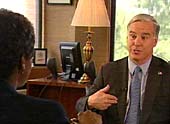 Howard Dean: I'm not going to handicap Senator Durbin. Senator Durbin is one
of the most fantastic people in the United States Senate, an honest,
decent person. Whether he apologizes or not is up to him; not up to
me. It's up to him. But I think he's terrific. And I think he's right
at the top of my list of great people.
Howard Dean: I'm not going to handicap Senator Durbin. Senator Durbin is one
of the most fantastic people in the United States Senate, an honest,
decent person. Whether he apologizes or not is up to him; not up to
me. It's up to him. But I think he's terrific. And I think he's right
at the top of my list of great people.
All I'm going to say about this stuff is the Republicans want to focus
on personal attacks. What we want to focus on is making sure Social
Security works and isn't wrecked by people who can't balance the budget.
What we want to focus on is a defense policy, which includes watching
out for things like Iran and North Korea and not letting them -- putting
them on the back burner when they're more of a danger to us than Iraq.
These are fundamental national security issues and economic issues,
which are not being addressed by the Republicans and it's why they attack
people like me and Dick Durbin.
|

|
| |
|
Messenger
for the Democratic Party |
|
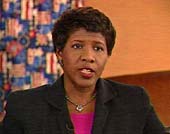 Gwen Ifill: I understand it's what you want to talk about, but it's also
clear that that's not what most of the headlines have been. To what
degree --
Gwen Ifill: I understand it's what you want to talk about, but it's also
clear that that's not what most of the headlines have been. To what
degree --
Howard Dean: We don't control the headlines, Gwen, either.
Gwen Ifill: To what degree does it become an example of your giving
them a bat to beat you over the head? If you know that they're watching
you, if you know they're going to pounce on every word, why give them
something?
Howard Dean: They're going to pounce on every word anyway. They're
going to make stuff up and the press is going to write it because it's
good columns. That's essentially what they do. I don't say they make
up quotes and put them in the paper. What they do is they put stuff
together, take it out of context and then make personal attacks.
Well, this is a new day at the DNC. Every time they hit us with a personal
attack not only are we going to run right over them; we're going to
stick to issues.
Gwen Ifill: Because of the things you said -- not all together but
separately about Republicans being a white Christian party --
 Howard Dean: There's nothing wrong with saying that. I don't apologize for
that. I'm a white Christian. It turns out that Republicans are mostly
white Christian. I find nothing wrong. They have spent a lot of time
trying to insinuate that I said something bad about white Christians.
I am one. And I'm not ashamed to talk about it.
Howard Dean: There's nothing wrong with saying that. I don't apologize for
that. I'm a white Christian. It turns out that Republicans are mostly
white Christian. I find nothing wrong. They have spent a lot of time
trying to insinuate that I said something bad about white Christians.
I am one. And I'm not ashamed to talk about it.
Gwen Ifill: It's clear --
Howard Dean: This is Republican spin and Republican nonsense. I think
we ought to talk about Social Security; I think we ought to talk about
what we're going to do about gas prices. I think we ought to talk about
corruption in government so we don't have the majority leader of the
U.S. Congress having been reprimanded -- ethics reprimanded three times
investigated by the district attorney.
We just need a new day in Washington where we're going to have honesty,
some hard work and some focus on the issues that people care about and
not all these personal attacks.
Gwen Ifill: How do you do that? As a DNC chairman, are you the messenger
for the party or are you the organizer for the party?
Howard Dean: Well I think I wouldn't call myself the messenger. I think
Harry Reid and Nancy Pelosi have done a great job in Congress making
sure that the president doesn't turn Social Security over to the same
people that gave us Enron, for example. But I certainly am part of the
message team. And I certainly have a lot to do with trying to organize
the party.
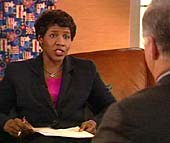 Gwen Ifill: Let's talk about the message for a moment. You just articulated
a few of the things you think Democrats should be focusing on, yet we're
at a time where polls show that Americans look at the president and
they're not so certain about where we are in Iraq. They're not so certain
about his remedy for Social Security. They're not so certain about his
remedy for tax reform. So shouldn't that be an opportunity that the
Democrats can seize and are they doing that?
Gwen Ifill: Let's talk about the message for a moment. You just articulated
a few of the things you think Democrats should be focusing on, yet we're
at a time where polls show that Americans look at the president and
they're not so certain about where we are in Iraq. They're not so certain
about his remedy for Social Security. They're not so certain about his
remedy for tax reform. So shouldn't that be an opportunity that the
Democrats can seize and are they doing that?
Howard Dean: I think we can get our message out. Our message is going
to be a message about hope. We're going to stop what the Republicans
are doing to this country. We're going to stop the fear. We're going
to stop the anger. What we want to do is work together. We want to go
back to the time when Republicans and Democrats worked together for
the good of the country and didn't put the interest of their party ahead
of the country.
|

|
| |
|
Criticizing
the president's policies
|
|
Gwen Ifill: How about an exit strategy for Iraq? Should Democrats be
coming up with their own plan that they should be pressing on the White
House?
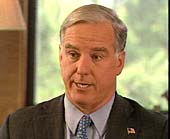 Howard Dean: You know, that's always a difficult issue. My sense is that there
is a feeling that we ought to have some kind of a timetable from the
president. The president hasn't been successful. On the other hand,
Democrats in general and people in general in the Congress both Republicans
and Democrats historically have given a president a wide berth on foreign
policy and military policy. We in Congress defer to the president.
Howard Dean: You know, that's always a difficult issue. My sense is that there
is a feeling that we ought to have some kind of a timetable from the
president. The president hasn't been successful. On the other hand,
Democrats in general and people in general in the Congress both Republicans
and Democrats historically have given a president a wide berth on foreign
policy and military policy. We in Congress defer to the president.
I think the president has made a mess of Iraq. As you know I didn't
think he should have gone in there in the first place because I thought
there would probably be a very messy and difficult situation. I think
there's a reluctance in the Congress to criticize the president other
than his behavior in getting us in, which I don't think was entirely
truthful, but I do think now that the Democrats are going to have to
at some point come up with an exit strategy since the president is clearly
not interested in the facts on the ground in Iraq which are very, very
difficult for both the American troops and the Iraqi people.
Gwen Ifill: The president has called the Democrats essentially 'the
party of no', who put up the rhetorical stop sign every time that he
proposes something. What is the danger that the party will get tagged
as being simply obstructionist?
Howard Dean: I think it would be irresponsible for us to say 'yes' to
most of the president's agenda. The president's proposing people who
are way outside the mainstream to sit on the bench. People, for example,
who supported programs that most Americans wouldn't agree with are now
sitting on the court; proposed a crazy scheme for Social Security, which
would undermine the budgetary integrity of the United States, not to
mention undermining Social Security itself. But these are things we
have to say no to, to protect America.
But we're going to have a positive agenda that's going to be centered
around a strong national defense, a strong economic system with a balanced
budget in Bill Clinton's tradition and not in the tradition of Republicans
who have not balanced the budget for 35 years -- around a health care
system that's comprehensive and around a strong public education system.
That positive agenda I think will lay before the American people at
election time and then they'll have a choice. Do you want some people
who are seriously interested in policy, or do you want to go back to
this kind of culture of corruption that we now have in Washington?
|

|
|
The
future of the Democratic Party |
|
Gwen Ifill: Are there persuadable Democrats or Republicans out there
to your point of view, and is it being reflected at all in your fund
raising?
Howard Dean: We think people are persuadable because they're Americans
before they're Republicans or Democrats. And the fundraising is hard
to say. We have gotten a lot of small donations, which is terrific and
we're way ahead of where we were a couple of years ago in fundraising.
But I think it's too early to somehow link fundraising to an increased
amount of support.
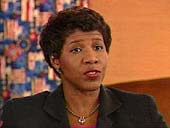 Gwen Ifill: How important is it that you speak to voters who used to be borderline
Democrats, for instance, religious voters or black voters, many of whom
are conservative and are drawn to arguments against things like gay
marriage, how do Democrats speak to them anymore?
Gwen Ifill: How important is it that you speak to voters who used to be borderline
Democrats, for instance, religious voters or black voters, many of whom
are conservative and are drawn to arguments against things like gay
marriage, how do Democrats speak to them anymore?
Howard Dean: Well, first of all we have to show up. The idea we're
going to win by campaigning in 18 states is just not going to happen
anymore. We need to be in Mississippi, in Utah, in Texas, and Oklahoma.
I've been to all four of those states in the relatively brief time I've
been chair.
Secondly, we need to speak about moral values. We really do. The Democratic
Party I think has the kind of moral values that most people, particularly
the religious community and particularly evangelicals like. I've had
numbers of calls from evangelicals and discussions with evangelicals
as well as high ranking members of the Catholic Church since I've been
DNC chair.
We want to reach out to folks. You know, the Republicans talk about
two issues: Abortion and gay rights. I don't think that most Democratic
officeholders have been supportive of gay marriage, but I think we are
supportive of rights for every single American. We may have some differences
of opinion with the religious community on those two issues but the
Democrats are much more in sync with the both evangelical Christians
and others, Catholics and so forth, on helping the poor, on making sure
that we have -- everybody has an opportunity. I am including everybody
in the American dream.
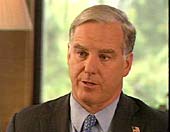 Those
are the real Christian values. And those are values that appear to be
absent from the Republican platform. I jokingly say in my speeches that
I have yet to see the biblical injunction that it's easier for a camel
to pass through the eye of a needle than it is for a rich man to enter
the kingdom of heaven. I have not seen that in the Republican Party platform. Those
are the real Christian values. And those are values that appear to be
absent from the Republican platform. I jokingly say in my speeches that
I have yet to see the biblical injunction that it's easier for a camel
to pass through the eye of a needle than it is for a rich man to enter
the kingdom of heaven. I have not seen that in the Republican Party platform.
So I don't think that the Republicans have any right to lecture Democrats
about morals because our morals really are pretty biblical when you
look at them. They really are about being good stewards of the earth
that God gave us, they really are about helping children, helping the
disenfranchised, making sure that everybody gets included. Those are
pretty good values.
Gwen Ifill: Finally, I have to ask you this: Dick Cheney said he doesn't
know who loves you except perhaps your mother. What does your mother
think about that?
Howard Dean: She doesn't think much. You know, the first time she ever
voted Democratic for president was this past election. She's one of
those Republicans who have had it. That's why my mother is a Democrat
now even after 75 years, it took her 75 years to change her mind.
Gwen Ifill: Mr. Chairman, thank you for much for talking with us.
Howard Dean: Thank you.
|
|
--- End ---
Originally posted on The Online NewsHour Transcripts site.
|




